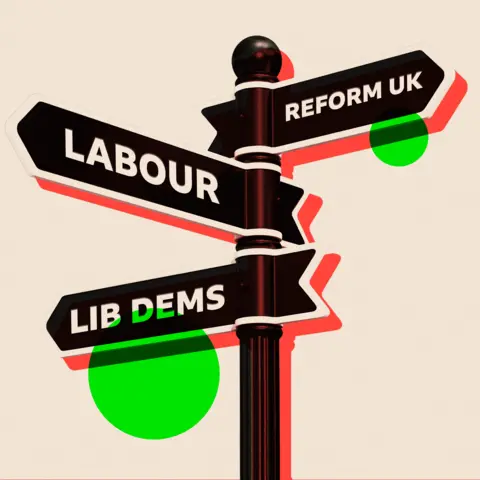
 BBC
BBCThe parliamentary Conservative birthday celebration is shocked and confused, even saddened.
Many knew that a major defeat was coming, despite the fact that some were in denial. Everyone agrees that the truth to date in the opposition is worse than anticipated.
“It’s like Lehman Brothers here,” muttered one Conservative MP, as he watched but a few other ousted colleagues spend months wandering through cardboard fields to preserve their assets.
Someone else said, “I thought there were plenty of MPs here with whom I would spend decades.” “They are really good friends. And almost all of them are gone. “It’s a reminder of how vulnerable we all are.”
And here are some of the additional contributors to the Conservatives’ 2019 colossal consumption: “It’s not nice to feel like a greybeard when you’ve only been here four and a half years.”
It is in that emotional environment that most MPs want to start answering questions rather than travel to later. However they are in negative motion to take action. Certainly it has also been difficult to understand what the appropriate questions are.
In fact, the most obvious and acute question is who should prevail over Rishi Sunak. The fact that no one has announced their candidacy yet – and there appears to be little clear noise from the negative to take action – tells its own personal story.
As a silhouetted cabinet minister said: “Look at 1997 and look at 2005 – 2005 was much longer and went much better.”
In 1997, when the Conservatives were forced out of government, John Primary was replaced by William Hague within 49 days. In 2005, it took seven months for David Cameron to be elected to replace Michael Howard. Lord Hague’s four years as premier were disastrous, with Lord Cameron leading the Conservatives back into government.
One Conservative MP said, “The question I hear people asking each other most is who is our David Cameron?”
In some circles, the wave against an extended management election most likely reflects a lack of enthusiasm for potential applicants.
One influential backbencher suggested that postponing the start of the contest would allow MPs to see how putative contenders handle opposition responsibilities, for example responding to the King’s Accent debate or raising urgent questions to cabinet ministers.
For others, despite the fact, a lengthy marketing campaign is an opportunity to have a more fundamental debate about how the Conservatives should rebuild.
“The problem is that we lost votes everywhere all at once,” said an MP on the party’s right. “Many people want us to think only about the challenge posed by reform, and we should, but we can’t ignore our other former voters.”
Imagine some constituencies for a moment.
 getty pictures
getty picturesThen in the 2019 general election, Boston and Skegness was the second safest Conservative seat in the country. The Birthday Party received 76.7% of the vote while Labor managed 15.2%. last age Reform UK claimed the seatDespite the fact that the Labor vote remained more or less the same.
If every Conservative loss were like this, the party would have a sunny incentive to continually focus on the citizens they lost in order to improve.
However take a look at nearby Stratford-upon-Avon. In the 2019 election the Conservatives won the seat with 60.6% of the vote, ahead of the Broad Democrats on 24.3%.
final age, the Broad Democrats won the seatIt was the first year since 1906 that a Conservative had won there.
But the Conservative vote collapsed in a couple of ways. The Broad Democrats lost a lot of votes but Reform also claimed 14.6% of the vote.
If those votes had gone to the Conservatives, the party would have clung to the seat outright.
 getty pictures
getty picturesThat’s before you get straight to all the seats where Conservative citizens switched to Labor in large numbers.
But it is simply not easy to imagine that without Nigel Farage’s involvement the Reform vote would have easily gone to the Conservatives.
“Most reformist voters don’t like the Conservative Party,” says Rob Ford, professor of political science at Manchester College. “He courted her for two years and nothing came of it.
“The Conservatives believe that because most Reform voters supported the Tories in 2019, they are the low-hanging fruit, easier to win back. But it is not followed. They feel that the Conservative Party has let them down, and that merely saying nice things to them will achieve nothing. Even if you can get some of them back, you will lose others in doing so.
Even MPs who believe the Conservatives want to prioritize the Reform UK vote acknowledge there may be indecision about what is driving the party’s surge.
“The big question about reform is whether it’s just about immigration,” said one lawmaker on the party’s right, “or whether it’s also about economics and trust.” Some of us think this is something very big, something like a Marine Le Pen moment.
“If we are right, it is no good to try for reform votes by putting more emphasis on immigration, because you can never satisfy enough of them, and you will not want to do that with some of them. “And meanwhile you’re shutting down the Lib Dems.”
Some other Conservatives said: “The answer is that we need to find a way to appeal to the voters we have lost to all parties. I don’t know how you do that in policy terms, but Keir Starmer showed you can do it while looking competent and serious. But I don’t know if any of the candidates we have right now can do that.”
Others worry, however, that a lengthy leadership tournament would allow Labor to gather unused arguments from the Conservatives about their legacy in government, with the Conservative Party also left unbalanced due to internal feuding.
One said, “Labor will just leave us on small boats – they don’t really have a plan.” “But we won’t be able to beat them because of our record. So it leaves room for improvement.”
In opposition, despite this fact, the theme of attacking the federal government is mechanical to the narrative and coverage.
And the sad truth about the Conservatives’ dwindling numbers is that they are finding it difficult to form an effective opposition. There will probably be 80 to 90 government ministers. Appoint a silhouette frontbencher to suit each and you’ll end up with only 30 backbenchers out of 121 MPs. He is ahead of two deputy audio systems.
A wave silhouette The minister said, “I think we have to choose the jobs we really want to shadow.” “A lot of things are going to double. I don’t know how this will all work.”
From the existential to the mundane – this is the spectrum of questions that a hurt Orthodox festival must now imagine. And so they all don’t think that they’ll get it properly.
One Conservative leader said, “If there’s one thing this campaign has taught me, it’s that things can always get worse.”
bbc indepth Uncharted is the home on the site and app for the most efficient research and experience from our government newshound. Below a special unused symbol, we will bring you ancient ideas that problem estimation, and in-depth reporting on the biggest problems will help you create a sense of a posh world. And we’ll also feature thought-provoking content from BBC Sounds and iPlayer. We’re looking at making small but big, and we want to know what you think – you can send us your comments by clicking the button below.
Discover more from news2source
Subscribe to get the latest posts sent to your email.





